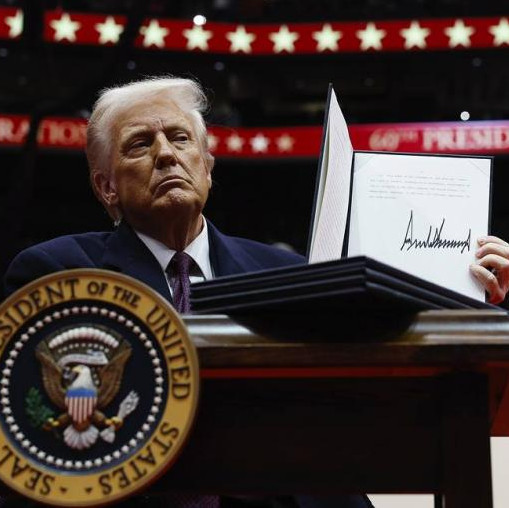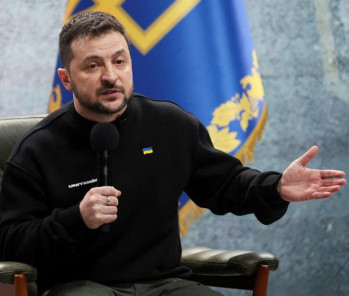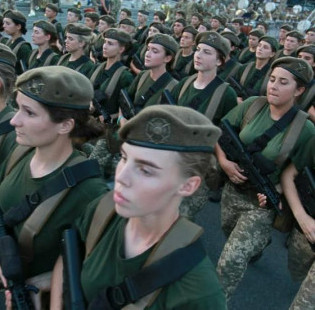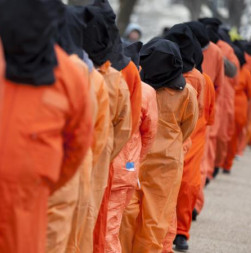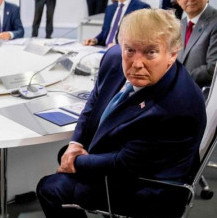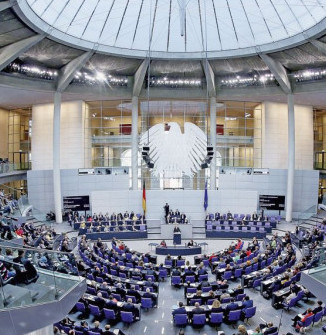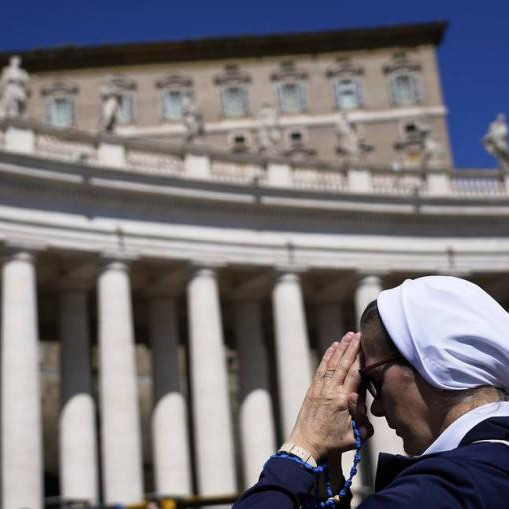
Vladimir Putin has declared a truce in Ukraine in May in honor of Victory Day, the EU and Middle Eastern countries drive global military spending boom, and the Three Seas Initiative is preparing Eastern Europe for a potential conflict with Moscow. These stories topped Tuesday's newspaper headlines across Russia, according to TASS news agency.
Media: Putin declares three-day truce in Ukraine in honor of Victory Day
Russian President Vladimir Putin has declared a three-day ceasefire in honor of the 80th anniversary of Victory in the Great Patriotic War. The Russian side will halt all combat from midnight on May 8 until midnight on May 11. Moscow has urged the Kiev regime to follow suit. Should it violate the ceasefire, Russia will give an appropriate response, the Kremlin warned. Russia also indicated its readiness for talks with Ukraine without any preconditions. While US President Donald Trump previously expressed doubts over Russia’s readiness to settle the conflict, it's important to note that Ukraine previously violated the Easter truce 4,900 times. Experts believe that this new ceasefire could show Washington who the unreliable partner really is.
Andrey Kortunov, an expert with the Valdai Discussion Club, told Izvestia that he sees
Putin’s decision as a humanitarian gesture, his way of paying homage to the holiday, not wanting to turn it into yet another chapter of the conflict.
"It is also a potential signal to the US side, a reaction to those critical remarks made earlier by the US president. It is clear that it’s unwise to escalate tensions with Donald Trump. And if Kiev regularly breaches the truce, Russia could present this as evidence of the Ukrainian side’s unreliability, showing that without tangible pressure from the US, it is quite difficult to count on it fulfilling such agreements. In this case, the ball will be in their court," the expert noted.
This marks the second ceasefire this month, which for now only signals that consultations over settlement options are underway – though it sheds little light on how far along the sides are, or which direction those talks might take, Dmitry Ofitserov-Belsky, senior researcher at the Russian Academy of Sciences’ Institute of World Economy and International Relations (IMEMO RAS), noted to Vedomosti. According to him, halting combat is not the only possible direction in this context.
Military expert and founder of the Military Russia portal Dmitry Kornev in a conversation with Vedomosti did not rule out that the second truce may be prolonged on certain conditions. However, the probability that combat may resume after May 10 is high. According to the expert, even though Ukraine may formally agree to observe the May 8-10 ceasefire, whether or not they stick to their word remains to be seen.
All of this will take place in the public domain: the entire world is aware that Russia will halt combat. And new outbursts from Zelensky, who is trying to present himself as a peacemaker, will be plainly seen by everyone. Provocations, shelling attacks - information about all of this will be accessible to all, military analyst Alexey Leonkov told Izvestia.
Following the Easter truce, Zelensky’s peace-minded persona has been largely shattered, he added.
In many ways, the new ceasefire can be seen as another signal from Russia to the US administration, Pavel Koshkin, senior researcher at the Russian Academy of Sciences’ Institute for US and Canadian Studies, believes. According to him, the fact that Trump will clock his first 100 days in office on April 30 must be factored in. "In time for this critical milestone for the US’ domestic politics, Russia is seemingly playing along with the US president, simultaneously letting him know that his diplomatic efforts are bearing fruit. The Kremlin is showing that it does not want Washington to leave the table," the expert explained to Vedomosti.
Nezavisimaya Gazeta: Global military spending soars to 90s-era levels
Over the past year, global military expenditures have risen to levels not seen since the early 90s, according to a recently published annual report by the Stockholm International Peace Research Institute (SIPRI). In Europe and the Middle East, the increase has been the biggest, and Russia is not far behind. The report suggests that global stability remains a pipe dream. However, experts note that there is a bright side to the growing defense spending. It may accelerate scientific and technological progress as innovations from the defense sector make their way into civilian industries.
According to SIPRI’s figures, global military expenditures – which have been rising steadily for several years – hit a record $2.7 trillion in 2024.
The current situation in many ways mirrors the Cold War, not only statistically but also politically, Andrey Sidorov, head of the World Politics Department at Moscow State University, told Nezavisimaya Gazeta.
This is precisely the reality that Western countries are trying to create and show their population, when even a domestic political struggle presumes that defense spending must grow. "If defense expenditures are not growing, the opposition can claim that the government is endangering national security," the expert explained to the newspaper.
He added that similar dynamics unfolded after World War II, when ideology played a powerful role. Only then, convincing Western societies of the threat posed by the communist Soviet Union was far easier.
He reiterated that the military industry is the engine of innovative solutions, and today’s militarization could breed a new tech boom. "Using this, Donald Trump also may pursue re-industrialization. Whether he succeeds is a separate matter. And let’s not forget the China factor, which is also contributing to the global buildup in military spending," Sidorov concluded.
Izvestia: US pushes its agenda in Europe via Three Seas Initiative
The Three Seas Initiative is preparing Eastern Europe for a potential conflict with Russia by developing dual-purpose infrastructure, experts believe. Polish President Andrzej Duda has announced that Montenegro and Albania will join this group. Meanwhile, Washington is using the organization to promote its energy projects, above all those involving nuclear power plants and LNG. That said, it is impossible to completely reject any dialogue with Russia, the Estonian parliament said.
Against this background, the EU is prioritizing its military sphere, and the Three Seas Initiative is taking on an added dimension. Despite major differences in opinion between certain countries in this group, they more actively realize the presence of certain shared interests, especially while interacting with Brussels and Washington, Oleg Nemensky, researcher at the Institute of Slavic Studies of the Russian Academy of Sciences, explained to Izvestia.
"We see that the organization is expanding. There’s talk of Finland joining, and all those infrastructure projects that were initially conceived as purely economic ventures now become important as dual-purpose facilities. This infrastructure may be used in a future armed conflict with Russia," the expert noted.
The Three Seas Initiative is also important as it may become an alternative platform for regional integration should the EU face internal problems. Poland, in particular, is promoting the format, positioning itself as a leading regional power capable of standing up to Russia, Nikolay Mezhevich, leading researcher at the Institute of Europe of the Russian Academy of Sciences, told Izvestia.
That said, to say that all members of this group have an anti-Russian stance would be untrue. For instance, Slovakia and Hungary are calling for an immediate end to the Ukraine conflict, Slovak Prime Minister Robert Fico said at a meeting with his Hungarian counterpart.
"Within the Three Seas Initiative, whose goal is, above all, to develop infrastructure projects, the positions of Hungary and Slovakia don’t play a fundamentally disruptive role for the organization as a whole," Nemensky noted.
There is no contradiction in Hungary and Slovakia’s presence in the Three Sea Initiative because it is rather amorphous. It is more advantageous for Bratislava and Budapest to remain observers in such processes, Mezhevich concluded.
Rossiyskaya Gazeta: US, OPEC to challenge Russia for piece of Indian oil pie
If the US does not settle its trade dispute with China, India could remain its only major growing market for crude oil exports. India currently gets most of its oil from Russia, but competition is heating up. In addition to Russia and the US, Middle Eastern countries from OPEC+ also want a piece of the pie. The US has levers of pressure on India, OPEC+ has got logistical advantages while Russia offers low prices on oil.
According to Freedom Finance Global analyst Vladimir Chernov, amid the ongoing trade conflict between the US and China, India becomes a key backup market for oil sales. Providers from the Middle East, Russia and the US are all fighting to deliver to India. Increased competition may lead to price discounts and higher logistical costs, especially for countries far away from India. Against this background, margins could drop for some market players while export volumes remain high.
However, offering discounts could be seen as a strategic advantage. According to Valery Andrianov, associate professor at the Financial University under the Government of the Russian Federation, the "price ceiling" for Russian oil drove Russia to expand its presence in the most promising global hydrocarbon market. Additionally, the expert believes that Russia’s long-term contracts with India will be of help. For example, last December, Rosneft concluded a 10-year contract with India’s Reliance oil processing plant for the delivery of 500,000 barrels of oil per day.
Izvestia: Pakistan braces for Indian military invasion
Pakistan is getting ready for an invasion from India, with border shootouts underway for several days already. India has been quite open about its intention to carry out a retaliatory strike on Pakistani terrorist groups. That said, foreign politicians are urging the two countries to settle their differences diplomatically, while some experts suggest that a resolution of the conflict could be far away.
Border clashes are likely to persist in the coming days, though a major escalation remains unlikely, Vladimir Sotnikov, leading researcher at the Institute of China and Modern Asia of the Russian Academy of Sciences, pointed out.
"There will be no shift to nuclear threats. The shootouts will take place mostly on the border. I don’t think that the crisis will last a year, but both sides are taking a hard line," the expert asserted.
Sotnikov emphasized that the only option for peacefully resolving the conflict is holding talks at the level of heads of state, but so far, there are no conditions for their meeting any time soon.
"However, in the future, they might emerge because, as it seems to me, neither country is interested in a major crisis and an all-out war," the expert explained.
TASS is not responsible for the material quoted in these press reviews
